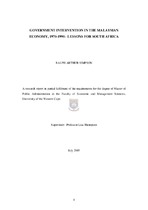| dc.contributor.advisor | Thompson, Lisa | |
| dc.contributor.author | Simpson, Ralph Arthur | |
| dc.contributor.other | School of Government | |
| dc.contributor.other | Faculty of Economics and Management Sciences | |
| dc.date.accessioned | 2013-07-19T09:14:47Z | |
| dc.date.available | 2007/04/20 11:32 | |
| dc.date.available | 2007/04/20 | |
| dc.date.available | 2013-07-19T09:14:47Z | |
| dc.date.issued | 2005 | |
| dc.identifier.uri | http://hdl.handle.net/11394/1696 | |
| dc.description | Masters in Public Administration - MPA | en_US |
| dc.description.abstract | This study examined the role the Malaysian government played in developing the Malaysian economy as a means to eliminating poverty and inequality and explored the lessons South Africa can learn from Malaysia's development experience. Under British colonial rule Malaysia developed a divided multi-ethnic society characterised by gross inequality and high levels of poverty. Jolted by the 1969 race riots and in a major departure from the laissez-faire economic policy, the government embarked on the New Economic Policy in 1970. This ambitious twenty-year social engineering plan ushered in greater state intervention in the economy. It greatly reduced poverty among indigenous Malays and made substantial progress towards achieving inter-ethnic economic parity. | en_US |
| dc.language.iso | en | en_US |
| dc.publisher | University of the Western Cape | en_US |
| dc.subject | Malaysia | en_US |
| dc.subject | Economic development | en_US |
| dc.subject | Economic policy | en_US |
| dc.subject | Economic conditions 1970 | en_US |
| dc.title | Government intervention in the Malaysian economy, 1970-1990: lessons for South Africa | en_US |
| dc.type | Thesis | en_US |
| dc.rights.holder | University of the Western Cape | en_US |
| dc.description.country | South Africa | |

